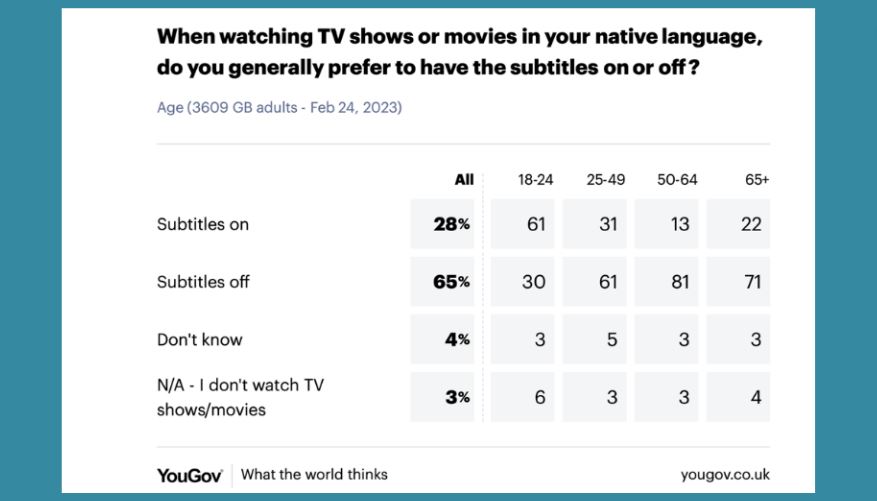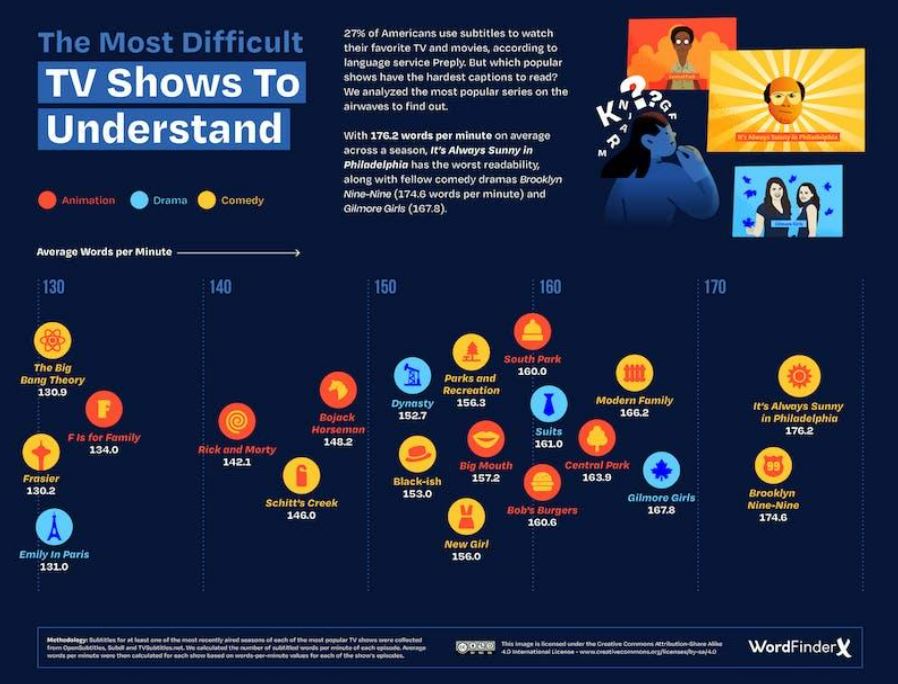Have you ever watched a television program with captioning, but the dialogue was still hard to follow? Perhaps the captions were inaccurate, or not well synched with the actor’s mouth movements, or maybe they were flying across the screen too quickly to process. I’ve experienced all of the above. More people are seeking out captions when enjoying media of all types, but issues with caption quality remain.
Two recent studies shed additional light on captioning—the increasing need and desire for it, especially among younger ages groups—but also one of the challenges that persist in making captions as user-friendly as possible.
Captions Popular with Young People
A new UK-based survey demonstrates the increasing popularity of captioning with younger age groups. YouGov asked 3,609 adults, “When watching TV shows or movies in your native language, do you generally prefer to have the subtitles on or off?” Overall, only 28% of respondents said yes, but when you look deeper, an interesting trend by age group is found.
Captions are very popular among 18-24-year-olds with 61% of respondents saying they prefer to use captions. This was followed by 31% for those aged 25-49. Captions were least popular with respondents aged 50-64 at 13%, followed by 22% for those aged 65+.
Hearing loss does not seem to be the most important factor in caption use as the groups with the least likely prevalence of hearing loss were most fond of captions, while the two groups with the highest likely prevalence of hearing issues were less eager to use them.
Perhaps this disparity relates to lingering stigma that surrounds admitting that you have trouble hearing which may prevent older adults from using captions. On the other hand, younger adults are used to consuming media on the go, and often with the volume muted, making captions mandatory for understanding.
Whatever the reasons, the good news for those of us with hearing loss is that social norms around captioning are changing. As demand for captioning increases, all of us will benefit too.

Quality Captions Require Accuracy, Synchronicity, and Proper Speed
While captions are gaining in popularity, usability issues remain a challenge. When it comes to caption quality I always focused on accuracy and synchronicity, but a recent study highlights the importance of caption speed as well.
Ireland’s National Disability Authority recommends that “English language subtitles for a general audience should not usually exceed 170 words-per-minute (wpm) and, if possible, be kept to a maximum 140 words.” But in a new study by WordFinderX, it was found that 16 top shows averaged well above recommended levels.
Study Results Highlight Many Top Programs have Rapid-Fire Captions
The study measured subtitle speed of the most recently aired seasons of the most popular TV shows, calculating the number of subtitled words-per-minute of each episode and then the average across all studied episodes of each show to give an overall words-per-minute count for each title.
Not surprisingly—humor is all about timing—comedy programs were the wordiest genre, with an average of 133.6-wpm measured across the 15 wordiest comedies. Quick retorts and pithy replies are often the backbone of comedy shows. Sometimes, it is challenging for the captions to keep up, but even when they do, it may be hard for viewers to read as quickly as the one-liners fly.
On the other hand, sci-fi/and superhero shows performed much better, with no shows in these genres exceeding 115-wpm, well below the 140-wpm recommended maximum. See the full list of shows in the graphic below. Are any of them on your watch list?

Most difficult TV shows to understand based on caption speed. Credit: WordFinderX
Increased Focus on Captioning Is Good News for All
The tide is turning on captions and as they become the norm across all forms of media, those of us with hearing loss will benefit the most. But vigilance will be required to make sure these captions are high quality: accurate, well-synced, and at an appropriate speed for understanding.

Shari Eberts is a passionate hearing health advocate and internationally recognized author and speaker on hearing loss issues. She is the founder of Living with Hearing Loss, a popular blog and online community for people with hearing loss, and an executive producer of We Hear You, an award-winning documentary about the hearing loss experience. Her book, Hear & Beyond: Live Skillfully with Hearing Loss, (co-authored with Gael Hannan) is the ultimate survival guide to living well with hearing loss. Shari has an adult-onset genetic hearing loss and hopes that by sharing her story, she will help others to live more peacefully with their own hearing issues. Connect with Shari: Blog, Facebook, LinkedIn, Twitter.






